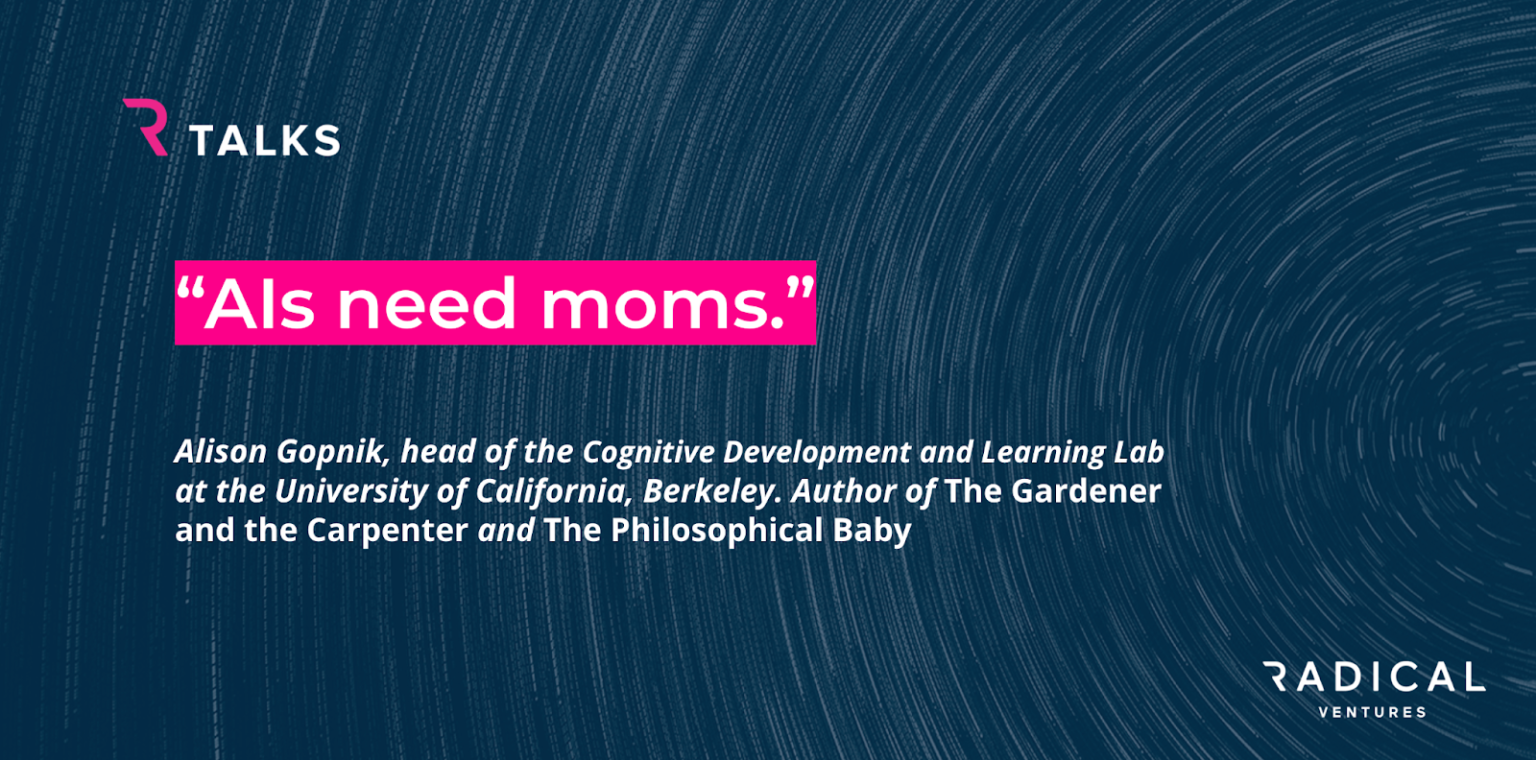In the same paper where Alan Turing outlined his famous criteria for determining when a computer is capable of thinking like a human being, he also shared advice on building a device that might one day pass the ‘Turing Test’. “Instead of trying to produce a programme to simulate the adult mind,” the pioneer of computer science writes,“why not rather try to produce one which simulates the child’s?”
The deep learning breakthroughs by Geoffrey Hinton and the architects of neural networks created technologies that have gone on to out-perform oncologists in cancer detection and help self-driving cars navigate our roads. However, to build systems that are capable of broadly generalizing across different use cases and experiences, researchers are looking to children for inspiration.
In this episode of our podcast, Radical Talks, renowned psychologist Alison Gopnik explores how AI systems may benefit from a better understanding of the way children learn and play. Gopnik, who runs the Cognitive Development and Learning Lab at the University of California, Berkeley, is also the best-selling author of The Philosophical Baby, and The Gardener & The Carpenter.
Like scientists, children constantly test hypotheses to better understand the world. Gopnik argues that the causal inference demonstrated by a child offers clues into how to build more resilient AI systems. Current AI technologies are a bit like the children of ‘helicopter’ parents – task-focused and good at doing one thing well. As is the case with raising a well-rounded child, to broaden the potential of AI there may be value in nurturing and rewarding curiosity in AI models.
If researchers are successful in building an AI that demonstrates child-like curiosity, a question emerges around the need for computational caregivers to keep AIs from causing damage to themselves or others and to ensure they benefit society more broadly. As Gopnik puts it, “AIs need moms.” Listen to the full episode.
AI News This Week
-
Deep reinforcement learning will transform manufacturing as we know it (TechCrunch)
“Deep reinforcement learning consistently produces results that other machine learning and optimization tools are incapable of.” The author notes Covariant, a Radical Ventures portfolio company, as an example of using deep reinforcement learning to transform the manufacturing process. Covariant is implementing its AI software in warehouses to provide robotic cognition, hardening supply chains by automating manual tasks performed by human hands.
-
Combining machine learning and nanopore construction creates an artificial intelligence nanopore for coronavirus detection (Nature)
Osaka University researchers discovered a faster method for detecting novel coronaviruses. By using a relatively simple procedure that combines nanopores together with AI, the team successfully identified four types of coronaviruses, and SARS-CoV-2 in saliva with a sensitivity of 90% within 5-minutes. This method bypasses the current bottleneck – extracting viral RNA from clinical specimens.
-
AI ‘dominated scientific output’ in recent years, UNESCO report shows (VentureBeat)
AI and robotics have dominated scientific output in countries of all income levels since 2018. In 2017, CIFAR’s Pan-Canadian AI strategy, authored by Radical co-founders Tomi Poutanen and Jordan Jacobs, among others, was the world’s first national AI strategy. Since then, more than 30 countries have adopted dedicated national strategies for AI. This rapid digital transformation has been termed the Fourth Industrial Revolution (or Industry 4.0). The UNESCO Science Report monitors these trends in science governance worldwide to identify which development path countries are following.
-
Teenagers at greatest risk of self-harming could be identified almost a decade earlier (University of Cambridge Research)
Machine learning can identify adolescents at the greatest risk of self-harm almost a decade before they would self-report. The researchers identified two distinct subgroups among young people with significant risk factors present as early as age five. In the US, the rate of suicide among those aged 10 to 24 increased nearly 60% between 2007 and 2018. The driving factors are still unknown. While self-harm is not a direct predictor of suicide risk, assessing risk earlier could increase well-being for teenagers and save lives.
-
Just for fun: help a computer win the New Yorker Cartoon Caption Contest (The Pudding)
In an online experiment, the Pudding Team is finding out if an AI can help produce better-than-average jokes. Just as in Asimovian fictions, humans are being kept in the loop to ask the right questions to a machine that has infinite answers to produce answers (i.e. funny content). You can participate in this weekly experiment by evaluating their AI-generated jokes.
Radical Reads is edited by Ebin Tomy (Analyst, Radical Ventures)

